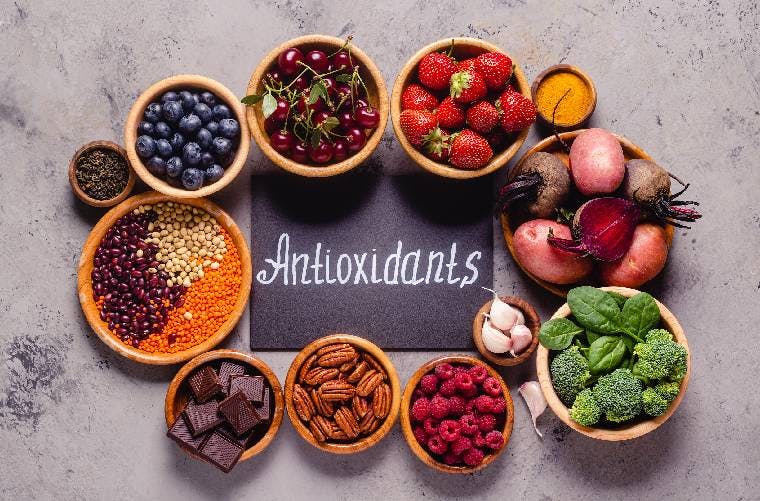In our quest for optimal health, understanding the role of antioxidants is crucial. These powerful compounds play a significant role in protecting our cells from oxidative stress, which can lead to various health issues. With increasing exposure to environmental stressors, such as pollution, UV radiation, and unhealthy diets, the need for antioxidants has never been more critical.
Having delved into nutrition and wellness, I’ve seen firsthand how incorporating antioxidants into our diets can lead to improved health outcomes. This article will explore what antioxidants are, how they function, their benefits, and the best sources to include in your diet.
What Are Antioxidants?

Antioxidants are molecules that help neutralize free radicals—unstable atoms that can cause cellular damage. Free radicals are produced naturally in the body during metabolic processes, but they can also arise from external sources such as:
- Pollution
- Cigarette smoke
- Radiation
- Certain chemicals
When free radicals accumulate, they can lead to oxidative stress, which has been linked to various chronic diseases, including heart disease, cancer, and neurodegenerative disorders.
How Do Antioxidants Work?
Antioxidants work by donating electrons to free radicals, stabilizing them and preventing them from causing cellular damage. This process helps protect vital cellular structures, including DNA, proteins, and lipids. The body has its own defense mechanisms against oxidative stress, but dietary antioxidants can provide additional support.
Types of Antioxidants
Antioxidants can be classified into two main categories:
- Primary Antioxidants: These are naturally produced by the body and include enzymes like superoxide dismutase (SOD), catalase, and glutathione peroxidase. They play a crucial role in neutralizing free radicals.
- Secondary Antioxidants: These are obtained from dietary sources and include vitamins, minerals, and phytochemicals. Key secondary antioxidants include:
- Vitamin C: A water-soluble vitamin that protects against oxidative damage in the aqueous environment of cells.
- Vitamin E: A fat-soluble vitamin that protects CM from oxidate damage.
- Beta-carotene: A precursor to vitamin A found in colorful fruits and vegetables, known for its antioxidant properties.
- Selenium: A mineral that plays a role in antioxidant enzyme functions.
Benefits of Antioxidants
Incorporating antioxidants into your diet can provide numerous health benefits, including:
- Reducing Oxidative Stress: Antioxidants help neutralize free radicals, reducing oxidative stress and its associated risks.
- Supporting Heart Health: Studies suggest that antioxidants may lower the risk of heart disease by improving blood vessel function and reducing inflammation.
- Enhancing Immune Function: Antioxidants can strengthen the immune system, helping the body fend off infections and illnesses.
- Promoting Healthy Aging: Antioxidants may protect against age-related diseases and support overall longevity by maintaining cellular health.
- Preventing Chronic Diseases: Research indicates that a diet rich in antioxidants may lower the risk of chronic diseases, including cancer, diabetes, and neurodegenerative disorders.
Sources of Antioxidants
Incorporating a variety of antioxidant-rich foods into your diet is essential for optimal health. Here are some excellent sources of antioxidants:
- Fruits:
- Berries (blueberries, strawberries, raspberries): High in vitamin C and flavonoids.
- Citrus fruits (oranges, lemons, grapefruits): Rich in vitamin C and other beneficial compounds.
- Pomegranates: Contain powerful polyphenols with strong antioxidant properties.
- Vegetables:
- Leafy greens (spinach, kale): Packed with vitamins A, C, and E, as well as other antioxidants.
- Cruciferous vegetables (broccoli, Brussels sprouts): Known for their cancer-fighting properties and high antioxidant content.
- Bell peppers: Particularly rich in vitamin C and carotenoids.
- Nuts and Seeds:
- Walnuts: High in antioxidants and healthy fats.
- Almonds: A great source of vitamin E and other beneficial compounds.
- Whole Grains:
- Oats and quinoa: Contain antioxidants and fiber that support overall health.
- Herbs and Spices:
- Turmeric: Contains curcumin, a potent antioxidant with anti-inflammatory properties.
- Green tea: Rich in catechins, a type of antioxidant known for its health benefits.
Tips for Maximizing Antioxidant Intake
To ensure you’re getting enough antioxidants in your diet, consider the following tips:
- Eat a Rainbow: Incorporate a variety of colorful fruits and vegetables into your meals to benefit from a diverse range of antioxidants.
- Opt for Whole Foods: Choose whole, minimally processed foods over refined options, as they typically contain higher levels of antioxidants.
- Stay Hydrated: Drink plenty of water and consider herbal teas, which can also provide antioxidants.
- Limit Processed Foods: Reduce your intake of processed foods high in sugars and unhealthy fats, which can contribute to oxidative stress.
- Cook with Spices: Use antioxidant-rich spices like turmeric, cinnamon, and ginger to enhance the flavor and health benefits of your meals.
Conclusion: Embracing Antioxidants for Better Health
Antioxidants are essential allies in our quest for better health, playing a vital role in protecting our cells from damage and reducing the risk of chronic diseases. By incorporating a variety of antioxidant-rich foods into our diets, we can harness their benefits and promote overall well-being.
As we continue to learn more about the impact of nutrition on health, embracing a diet rich in antioxidants is a proactive step toward a healthier future. Remember, the key to optimal health lies in balance and variety—so fill your plate with colorful fruits and vegetables, and enjoy the myriad of flavors and benefits they bring.



